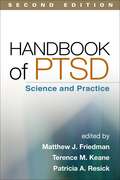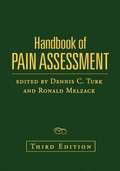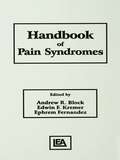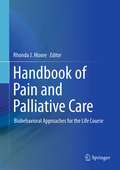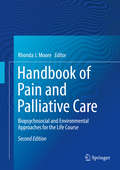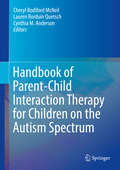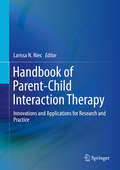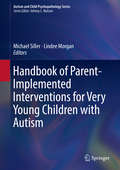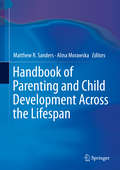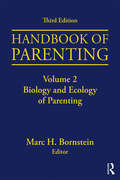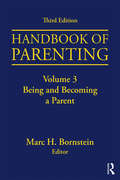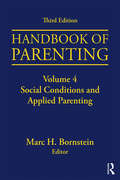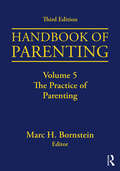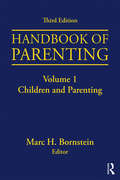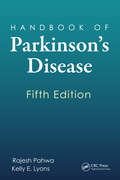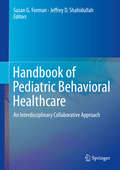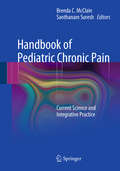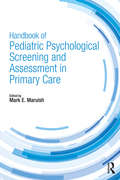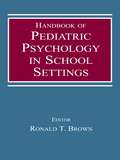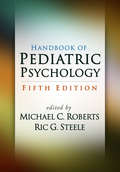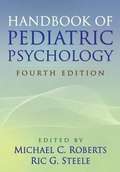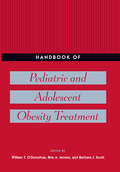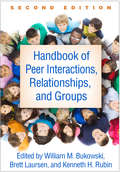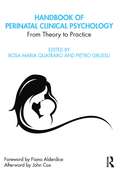- Table View
- List View
Handbook of PTSD, Second Edition: Science and Practice
by Matthew J. Friedman Patricia A. Resick Terence M. KeaneWidely regarded as the definitive reference, this handbook brings together foremost authorities on posttraumatic stress disorder (PTSD). Diagnostic, conceptual, and treatment issues are reviewed in depth. The volume examines the causes and mechanisms of PTSD on multiple levels, from psychological processes to genes and neurobiology. Risk and resilience processes are addressed across development and in specific populations. Contributors describe evidence-based assessment and treatment approaches as well as promising emerging interventions. The integrative concluding chapter identifies key unanswered questions with important implications for science and practice. New to This Edition *Reflects major research advances and the new diagnostic criteria in DSM-5. *Chapters on the dissociative subtype of PTSD, child assessment, couple and family therapies, and group treatments. *Chapters on research methods, Internet-based interventions, telemental health, and implementation of best practices. *Many new authors and extensively revised chapters.
Handbook of Pain Assessment, Third Edition
by Ronald Melzack Dennis TurkThis definitive clinical reference comprehensively reviews the most advanced methods for assessing the person in pain. The field's leading authorities present essential information and tools for evaluating psychosocial, behavioral, situational, and medical factors in patients' subjective experience, functional impairment, and response to treatment. Empirically supported instruments and procedures are detailed, including self-report measures, observational techniques, psychophysiological measures, and more. Best-practice recommendations are provided for assessing the most prevalent pain syndromes and for working with children, older adults, and people with communication difficulties. The book also weighs in on the limitations of existing methods and identifies key directions for future research. New to This Edition Concise chapters and a heightened focus on practical clinical issues. *Incorporates significant advances in knowledge about pain and pain syndromes. Numerous new or refined assessment instruments and procedures, including applications of advanced imaging techniques. Chapter providing an integrated, comprehensive assessment approach for any type of chronic pain.
Handbook of Pain Syndromes: Biopsychosocial Perspectives
by Andrew R. Block Edwin F. Kremer Ephrem FernandezPain syndromes involve a complex interaction of medical and psychological factors. In each syndrome unique physiological mechanisms are mediated by emotional states, personality traits, and environmental pressures to determine the nature and extent of pain complaints and pain-related disability. The Handbook addresses the complexities of chronic pain in three ways. Section I describes general concerns that cross-cut the different syndromes, such as the use of narcotic pain medications, the detection of deception and malingering, and the epidemiology of pain. Section II presents comprehensive reviews of a wide range of pain syndromes. Each covers basic pathophysiology, psychological factors found to influence the course of the syndrome, and syndrome-specific multidisciplinary treatment approaches. Most of the Section II chapters are coauthored by psychologists and physicians. Section III discusses pain in special populations, including the elderly and children. The Handbook is the most up-to-date, comprehensive, and integrated single-volume resource for all those professionally concerned with pain.
Handbook of Pain and Palliative Care
by Rhonda J. MooreHandbook of Pain and Palliative Care:Biobehavioral Approaches for the Life Course Rhonda J. Moore, editor This book takes both a biobehavioral and a lifespan approach to understanding long-term and chronic pain, and intervening to optimize patients' functioning. Rich in clinical diversity, chapters explore emerging areas of interest (computer-based interventions, fibromyalgia, stress), ongoing concerns (cancer pain, low back pain), and special populations (pediatric, elderly, military). This coverage provides readers with a knowledge base in assessment, treatment, and management that is up to date, practice strengthening, and forward looking. Subject areas featured in the Handbook include: Patient-practitioner communication Assessment tools and strategies Common pain conditions across the lifespan Biobehavioral mechanisms of chronic pain Pharmaceutical, neurological, and rehabilitative interventions Psychosocial, complementary/alternative, narrative, and spiritual approaches Ethical issue and future directions With the rise of integrative perspective and the emphasis on overall quality of life rather than discrete symptoms, pain management is gaining importance across medical disciplines. Handbook of Pain and Palliative Care stands out as a one-stop reference for a range of professionals, including health practitioners specializing in pain management or palliative care, clinical and health psychologists, public health professionals, and clinicians and administrators in long-term care and hospice.usculoskeletal pain. Finally, the text discusses broader issues in chronic pain management, including psychosocial issues associated with chronic pain, spiritual dimensions of chronic pain and suffering, contributions from the humanities and social sciences in terms of understanding the chronic pain experience, and highlights ethical issues in pain and palliative care. The collaborators for this project are from diverse cultural and biomedical settings, including the United Kingdom, United States, Italy, England, Singapore, Canada, Australia, and Norway. The expertise in this volume span the fields of clinical medicine, neuroscience, neurosurgery, literature, anthropology, art, neuroanatomy, pediatrics, gerontology, pain imaging, health disparities, transportation, rehabilitation, palliative medicine, philanthropy, the medical humanities, oncology, physiology, anesthesiology, pharmacology, genetics, stress management, psychology, dentistry, complementary and alternative medicine, spiritual care, nursing, pain policy, and clinical ethics. Whilst highly multidisciplinary, authors explore the evidence base for chronic pain and palliative care in their individual professional areas and each has provided valuable insights with the hope that it will result in improved pain control and palliative care.
Handbook of Pain and Palliative Care: Biopsychosocial and Environmental Approaches for the Life Course
by Rhonda J. MooreThis comprehensive revision of the invaluable reference presents a rigorous survey of pain and palliative care phenomena across the lifespan and across disciplines. Grounded in the biopsychosocial viewpoint of its predecessor, it offers up-to-date understanding of assessments and interventions for pain, the communication of pain, common pain conditions and their mechanisms, and research and policy issues. In keeping with the current public attention to painkiller use and misuse, contributors discuss a full range of pharmacological and non-pharmacological approaches to pain relief and management. And palliative care is given expanded coverage, with chapters on interventive, ethical, and spiritual concerns.· Pain, intercultural communication, and narrative medicine.· Assessment of pain: tools, challenges, and special populations.· Persistent pain in the older adult: practical considerations for evaluation and management.· Acute to chronic pain: transition in the post-surgical patient. · Evidence-based pharmacotherapy of chronic pain.· Complementary and integrative health in chronic pain and palliative care.· The patient’s perspective of chronic pain.· Disparities in pain and pain care.This mix of evolving and emerging topics makes the Second Edition of the Handbook of Pain and Palliative Care a necessity for health practitioners specializing in pain management or palliative care, clinical and health psychologists, public health professionals, and clinicians and administrators in long-term care and hospice.
Handbook of Parent-Child Interaction Therapy for Children on the Autism Spectrum
by Cynthia M. Anderson Cheryl Bodiford McNeil Lauren Borduin QuetschThis handbook offers a theoretical foundation for the adaptation of Parent-Child Interaction Therapy (PCIT) for children with autism spectrum disorder (ASD) and their families. The volume examines current treatments for children with ASD and provides a rationale for why PCIT is considered a strong option to address many of the concerns found within this population of children and families. It presents an overview of PCIT theory, the goals of PCIT, the unique aspects of the treatment, and the exceptional outcomes. The handbook demonstrates the versatility of PCIT in conjunction with standard science-based therapies in addressing specific behavioral problems in this young population. Chapters provide a theoretical basis for PCIT, the empirical evidence for its efficacy, clinical considerations, and training issues. Chapters also offer a selection of case studies that help illustrate how PCIT has been successful in treating children with autism. The handbook concludes by identifying the gaps that need to be addressed by future research. Topics featured in the Handbook include:A clinical description of Parent-Child Interaction Therapy. The effects of medication for individuals with ASD.The importance of parent-child interactions in social communication and development.Teaching complex social behavior to children with ASD.Internet-delivered PCIT (I-PCIT) for children with autism.Child-Directed Interaction treatments for children with ASD.Parent-Directed Interaction treatments for children on the autism spectrum. The Handbook of Parent-Child Interaction Therapy for Children on the Autism Spectrum is a must-have resource for researchers, professors, clinicians/practitioners/therapists, and graduate students across many interrelated disciplines, including child and school psychology, behavioral therapy, social work, child and adolescent psychiatry, pediatrics, and family studies as well as occupational therapy, physical therapy, behavior analysis, and speech therapy.
Handbook of Parent-Child Interaction Therapy: Innovations and Applications for Research and Practice
by Larissa N. NiecThis handbook examines advances in the evidence-based behavioral family intervention, parent-child interaction therapy (PCIT). It surveys innovative adaptations tailored to specific diagnostic concerns, client populations, treatment settings, and delivery formats. Chapters provide rationales for adaptation, reviews of relevant research, and discussions of advantages and challenges. Case studies illustrate the implementation of the adaptations and help to make new techniques concrete. The handbook offers practical descriptions of the adaptations to PCIT, comprehensively reviews treatment outcome literature, and integrates cutting-edge implementation science into an exploration of the current dissemination strategies in PCIT. The handbook concludes with a consideration of the questions that remain to be addressed to extend the reach of PCIT among traditionally underserved families and to continue to advance the science and practice of children’s mental health interventions. Featured topics include:PCIT for children with callous-unemotional traits.PCIT for families with a history of child maltreatment.Group PCIT.PCIT for military families.The PCIT CALM program for treating anxiety in young children.PCIT for American Indian families.Transporting and disseminating PCIT internationally.Using technology to expand the reach of PCIT. The Handbook of Parent-Child Interaction Therapy is a must-have resource for researchers, professors, instructors, clinicians, and graduate students in child and school psychology, child psychiatry, and social work as well as such related disciplines as developmental, clinical, counseling, and community psychology, family studies, and mental health services and agencies.
Handbook of Parent-Implemented Interventions for Very Young Children with Autism (Autism and Child Psychopathology Series)
by Michael Siller Lindee MorganThis handbook offers practical strategies and evidence-based parent-implemented interventions for very young children with autism spectrum disorder (ASD). It explores this important subject within the context of rapidly increasing numbers of toddlers who are diagnosed with ASD during the second year of life. The handbook discusses how parents of young children with ASD can effectively be supported, taught, and coached to implement evidence-based parenting strategies and intervention techniques, and describes a broad range of developmentally appropriate programs at the family, community, and service delivery levels. In addition, the handbook examines individual differences in parenting cognitions, emotions, and practices and proposes strategies for supporting the varying capacities of diverse families to meet the needs of young children with ASD. Chapters provide diverse coverage, spanning cultural/socio-economic differences as well as differences in family structure; parenting cognitions, emotions, and practices; parental learning styles; and access to social support. Featured topics include: Supporting families of high-risk infants who have an older sibling with ASD.The use of video feedback strategies in parent-mediated early ASD intervention. The Incredible Years (IY) Parent Program for preschool children with ASD and language delays. Self-help for parents of children with ASD. The Family Implemented TEACCH for Toddlers (FITT) support model. Parent-implemented interventions for underserved families in Taiwan. Family and provider-based interventions in South Asia. The Handbook of Parent-Implemented Interventions for Very Young Children with Autism is a must-have resource for researchers, clinicians/professionals, and graduate students in clinical child, school, and developmental psychology, family studies, behavioral therapy, and social work as well as rehabilitation medicine/therapy, child and adolescent psychiatry, pediatrics, and special education/educational psychology.
Handbook of Parenting and Child Development Across the Lifespan
by Matthew R. Sanders Alina MorawskaThis handbook presents the latest theories and findings on parenting, from the evolving roles and tasks of childrearing to insights from neuroscience, prevention science, and genetics. Chapters explore the various processes through which parents influence the lives of their children, as well as the effects of parenting on specific areas of child development, such as language, communication, cognition, emotion, sibling and peer relationships, schooling, and health. Chapters also explore the determinants of parenting, including consideration of biological factors, parental self-regulation and mental health, cultural and religious factors, and stressful and complex social conditions such as poverty, work-related separation, and divorce. In addition, the handbook provides evidence supporting the implementation of parenting programs such as prevention/early intervention and treatments for established issues. The handbook addresses the complementary role of universal and targeted parenting programs, the economic benefits of investment in parenting programs, and concludes with future directions for research and practice. Topics featured in the Handbook include: · The role of fathers in supporting children’s development. · Developmental disabilities and their effect on parenting and child development. · Child characteristics and their reciprocal effects on parenting. · Long-distance parenting and its impact on families. · The shifting dynamic of parenting and adult-child relationships. · The effects of trauma, such as natural disasters, war exposure, and forced displacement on parenting. The Handbook of Parenting and Child Development Across the Lifespan is an essential reference for researchers, graduate students, clinicians, and therapists and professionals in clinical child and school psychology, social work, pediatrics, developmental psychology, family studies, child and adolescent psychiatry, and special education.
Handbook of Parenting: Volume 2: Biology and Ecology of Parenting, Third Edition
by Marc H. BornsteinThis highly anticipated third edition of the Handbook of Parenting brings together an array of field-leading experts who have worked in different ways toward understanding the many diverse aspects of parenting. Contributors to the Handbook look to the most recent research and thinking to shed light on topics every parent, professional, and policymaker wonders about. Parenting is a perennially "hot" topic. After all, everyone who has ever lived has been parented, and the vast majority of people become parents themselves. No wonder bookstores house shelves of "how-to" parenting books, and magazine racks in pharmacies and airports overflow with periodicals that feature parenting advice. However, almost none of these is evidence-based. The Handbook of Parenting is. Period. Each chapter has been written to be read and absorbed in a single sitting, and includes historical considerations of the topic, a discussion of central issues and theory, a review of classical and modern research, and forecasts of future directions of theory and research. Together, the five volumes in the Handbook cover Children and Parenting, the Biology and Ecology of Parenting, Being and Becoming a Parent, Social Conditions and Applied Parenting, and the Practice of Parenting. Volume 2, Biology and Ecology of Parenting, relates parenting to its biological roots and sets parenting in its ecological framework. Some aspects of parenting are influenced by the organic makeup of human beings, and the chapters in Part I, on the Biology of Parenting, examine the evolution of parenting, the psychobiological determinants of parenting in nonhumans, and primate parenting, as well as the genetic, prenatal, neuroendocrinological, and neurobiological bases of human parenting. A deep understanding of what it means to parent also depends on the ecologies in which parenting takes place. Beyond the nuclear family, parents are embedded in, influence, and are themselves affected by larger social systems. The chapters in Part II, on the Ecology of Parenting, examine the ancient and modern histories of parenting as well as epidemiology, neighborhoods, educational attainment, socioeconomic status, culture, and environment to provide an overarching relational developmental contextual systems perspective on parenting.
Handbook of Parenting: Volume 3: Being and Becoming a Parent, Third Edition
by Marc H. BornsteinThis highly anticipated third edition of the Handbook of Parenting brings together an array of field-leading experts who have worked in different ways toward understanding the many diverse aspects of parenting. Contributors to the Handbook look to the most recent research and thinking to shed light on topics every parent, professional, and policymaker wonders about. Parenting is a perennially "hot" topic. After all, everyone who has ever lived has been parented, and the vast majority of people become parents themselves. No wonder bookstores house shelves of "how-to" parenting books, and magazine racks in pharmacies and airports overflow with periodicals that feature parenting advice. However, almost none of these is evidence-based. The Handbook of Parenting is. Period. Each chapter has been written to be read and absorbed in a single sitting, and includes historical considerations of the topic, a discussion of central issues and theory, a review of classical and modern research, and forecasts of future directions of theory and research. Together, the five volumes in the Handbook cover Children and Parenting, the Biology and Ecology of Parenting, Being and Becoming a Parent, Social Conditions and Applied Parenting, and the Practice of Parenting. Volume 3, Being and Becoming a Parent, considers a large cast of characters responsible for parenting, each with her or his own customs and agenda, and examines what the psychological characteristics and social interests of those individuals reveal about what parenting is. Chapters in Part I, on The Parent, show just how rich and multifaceted is the constellation of children’s caregivers. Considered first are family systems and then successively mothers and fathers, coparenting and gatekeeping between parents, adolescent parenting, grandparenting, and single parenthood, divorced and remarried parenting, lesbian and gay parents and, finally, sibling caregivers and nonparental caregiving. Parenting also draws on transient and enduring physical, personality, and intellectual characteristics of the individual. The chapters in Part II, on Becoming and Being a Parent, consider the intergenerational transmission of parenting, parenting and contemporary reproductive technologies, the transition to parenthood, and stages of parental development, and then chapters turn to parents' well-being, emotions, self-efficacy, cognitions, and attributions as well as socialization, personality in parenting, and psychoanalytic theory. These features of parents serve many functions: they generate and shape parental practices, mediate the effectiveness of parenting, and help to organize parenting.
Handbook of Parenting: Volume 3: Being and Becoming a Parent, Third Edition
by Marc H. BornsteinThis highly anticipated third edition of the Handbook of Parenting brings together an array of field-leading experts who have worked in different ways toward understanding the many diverse aspects of parenting. Contributors to the Handbook look to the most recent research and thinking to shed light on topics every parent, professional, and policymaker wonders about. Parenting is a perennially "hot" topic. After all, everyone who has ever lived has been parented, and the vast majority of people become parents themselves. No wonder bookstores house shelves of "how-to" parenting books, and magazine racks in pharmacies and airports overflow with periodicals that feature parenting advice. However, almost none of these is evidence-based. The Handbook of Parenting is. Period. Each chapter has been written to be read and absorbed in a single sitting, and includes historical considerations of the topic, a discussion of central issues and theory, a review of classical and modern research, and forecasts of future directions of theory and research. Together, the five volumes in the Handbook cover Children and Parenting, the Biology and Ecology of Parenting, Being and Becoming a Parent, Social Conditions and Applied Parenting, and the Practice of Parenting.Volume 3, Being and Becoming a Parent, considers a large cast of characters responsible for parenting, each with her or his own customs and agenda, and examines what the psychological characteristics and social interests of those individuals reveal about what parenting is. Chapters in Part I, on The Parent, show just how rich and multifaceted is the constellation of children’s caregivers. Considered first are family systems and then successively mothers and fathers, coparenting and gatekeeping between parents, adolescent parenting, grandparenting, and single parenthood, divorced and remarried parenting, lesbian and gay parents and, finally, sibling caregivers and nonparental caregiving. Parenting also draws on transient and enduring physical, personality, and intellectual characteristics of the individual. The chapters in Part II, on Becoming and Being a Parent, consider the intergenerational transmission of parenting, parenting and contemporary reproductive technologies, the transition to parenthood, and stages of parental development, and then chapters turn to parents' well-being, emotions, self-efficacy, cognitions, and attributions as well as socialization, personality in parenting, and psychoanalytic theory. These features of parents serve many functions: they generate and shape parental practices, mediate the effectiveness of parenting, and help to organize parenting.
Handbook of Parenting: Volume 4: Social Conditions and Applied Parenting, Third Edition
by Marc H. BornsteinThis highly anticipated third edition of the Handbook of Parenting brings together an array of field-leading experts who have worked in different ways toward understanding the many diverse aspects of parenting. Contributors to the Handbook look to the most recent research and thinking to shed light on topics every parent, professional, and policymaker wonders about. Parenting is a perennially "hot" topic. After all, everyone who has ever lived has been parented, and the vast majority of people become parents themselves. No wonder bookstores house shelves of "how-to" parenting books, and magazine racks in pharmacies and airports overflow with periodicals that feature parenting advice. However, almost none of these is evidence-based. The Handbook of Parenting is. Period. Each chapter has been written to be read and absorbed in a single sitting, and includes historical considerations of the topic, a discussion of central issues and theory, a review of classical and modern research, and forecasts of future directions of theory and research. Together, the five volumes in the Handbook cover Children and Parenting, the Biology and Ecology of Parenting, Being and Becoming a Parent, Social Conditions and Applied Parenting, and the Practice of Parenting. Volume 4, Social Conditions and Applied Parenting, describes socially defined groups of parents and social conditions that promote variation in parenting. The chapters in Part I, on Social and Cultural Conditions of Parenting, start with a relational developmental systems perspective on parenting and move to considerations of ethnic and minority parenting among Latino and Latin Americans, African Americans, Asians and Asian Americans, Indigenous parents, and immigrant parents. The section concludes with considerations of disabilities, employment, and poverty on parenting. Parents are ordinarily the most consistent and caring people in children’s lives. However, parenting does not always go right or well. Information, education, and support programs can remedy potential ills. The chapters in Part II, on Applied Issues in Parenting, begin with how parenting is measured and follow with examinations of maternal deprivation, attachment, and acceptance/rejection in parenting. Serious challenges to parenting—some common, such as stress and depression, and some less common, such as substance abuse, psychopathology, maltreatment, and incarceration—are addressed as are parenting interventions intended to redress these trials.
Handbook of Parenting: Volume 5: The Practice of Parenting, Third Edition
by Marc H. BornsteinThis highly anticipated third edition of the Handbook of Parenting brings together an array of field-leading experts who have worked in different ways toward understanding the many diverse aspects of parenting. Contributors to the Handbook look to the most recent research and thinking to shed light on topics every parent, professional, and policy maker wonders about. Parenting is a perennially "hot" topic. After all, everyone who has ever lived has been parented, and the vast majority of people become parents themselves. No wonder bookstores house shelves of "how-to" parenting books and magazine racks in pharmacies and airports overflow with periodicals that feature parenting advice. However, almost none of these is evidence-based. The Handbook of Parenting is. Period. Each chapter has been written to be read and absorbed in a single sitting, and includes historical considerations of the topic, a discussion of central issues and theory, a review of classical and modern research, and forecasts of future directions of theory and research. Together, the five volumes in the Handbook cover Children and Parenting, the Biology and Ecology of Parenting, Being and Becoming a Parent, Social Conditions and Applied Parenting, and the Practice of Parenting. Volume 5, The Practice of Parenting, describes the nuts-and-bolts of parenting as well as the promotion of positive parenting practices. Parents meet the biological, physical, and health requirements of children. Parents interact with children socially. Parents stimulate children to engage and understand the environment and to enter the world of learning. Parents provision, organize, and arrange their children’s home and local environments and the media to which children are exposed. Parents also manage child development vis-à-vis childcare, school, the circles of medicine and law, as well as other social institutions through their active citizenship. The chapters in Part I, on Practical Parenting, review the ethics of parenting, parenting and the development of children's self-regulation, discipline, prosocial and moral development, and resilience as well as children’s language, play, cognitive, and academic achievement and children’s peer relationships. The chapters in Part II, on Parents and Social Institutions, explore parents and their children’s childcare, activities, media, schools, and healthcare and examine relations between parenthood and the law, public policy, and religion and spirituality.
Handbook of Parenting: Volume I: Children and Parenting, Third Edition
by Marc H. BornsteinThis highly anticipated third edition of the Handbook of Parenting brings together an array of field-leading experts who have worked in different ways toward understanding the many diverse aspects of parenting. Contributors to the Handbook look to the most recent research and thinking to shed light on topics every parent, professional, and policymaker wonders about. Parenting is a perennially "hot" topic. After all, everyone who has ever lived has been parented, and the vast majority of people become parents themselves. No wonder bookstores house shelves of "how-to" parenting books and magazine racks in pharmacies and airports overflow with periodicals that feature parenting advice. However, almost none of these is evidence-based. The Handbook of Parenting is. Period. Each chapter has been written to be read and absorbed in a single sitting, and includes historical considerations of the topic, a discussion of central issues and theory, a review of classical and modern research, and forecasts of future directions of theory and research. Together, the five volumes in the Handbook cover Children and Parenting, the Biology and Ecology of Parenting, Being and Becoming a Parent, Social Conditions and Applied Parenting, and the Practice of Parenting. Volume 1, Children and Parenting, considers parenthood as a functional status in the life cycle: Parents protect, nurture, and teach their progeny, even if human development is more dynamic than can be determined by parental caregiving alone. Volume 1 of the Handbook of Parenting begins with chapters concerned with how children influence parenting. Notable are their more obvious characteristics, like child age or developmental stage; but subtler ones, like child gender, physical state, temperament, mental ability, and other individual-differences factors, are also instrumental. The chapters in Part I, on Parenting across the Lifespan, discuss the unique rewards and special demands of parenting children of different ages and stages – infants, toddlers, youngsters in middle childhood, and adolescents—as well as the modern notion of parent-child relationships in emerging adulthood, adulthood, and old age. The chapters in Part II, on Parenting Children of Varying Status, discuss common issues associated with parenting children of different genders and temperaments as well as unique situations of parenting adopted and foster children and children with a variety of special needs, such as those with extreme talent, born preterm, who are socially withdrawn or aggressive, or who fall on the autistic spectrum, manifest intellectual disabilities, or suffer a chronic health condition.
Handbook of Parkinson's Disease (Neurological Disease and Therapy)
by Rajesh Pahwa Kelly E. LyonsHighly Commended, BMA Medical Book Awards 2014This volume has long prevailed as one of the leading resources on Parkinson's disease (PD). Fully updated with practical and engaging chapters on pathology, neurochemistry, etiology, and breakthrough research, this source spans every essential topic related to the identification, assessment, and treatme
Handbook of Pediatric Behavioral Healthcare: An Interdisciplinary Collaborative Approach
by Jeffrey D. Shahidullah Susan G. FormanThis handbook addresses the delivery of high quality pediatric behavioral healthcare services that are multitiered, evidence-based, and integrated, involving interprofessional collaboration across child serving systems, such as pediatrician offices and schools. The book sets forth a contemporary, leading edge approach that reflects the relationship between biological and psychosocial development and the influence of multiple systems, including the family, community, school, and the healthcare system on child development and functioning. It assists child-focused providers in developing knowledge about the relationship between biological and psychosocial development and between pediatric physical health and behavioral health problems. Chapters cover common chronic illnesses and behavioral conditions and include guidelines for screening, assessment, diagnosis, prevention, and coordinated intervention. Chapters also include representative case studies that help illustrate efficacious, effective service-delivery approaches. The handbook concludes with recommendations for future research and directions for integrated pediatric behavioral healthcare.Topics featured in the Handbook include:Behavioral health aspects of chronic physical health conditions, including asthma, diabetes, chronic pain, traumatic brain injury, and cancer.Physical health implications of behavioral health and educational problems, including ADHD, learning disabilities, substance abuse, and ASD.Coping with chronic illness and medical stress.Patient adherence to medical recommendations and treatments.School reintegration after illness.The Handbook of Pediatric Behavioral Healthcare is a must-have resource for researchers, professors, and graduate students as well as clinicians, therapists, and other practitioners in clinical child and school psychology, primary care medicine, social work, child and adolescent psychiatry, public health, health psychology, pediatric medicine, nursing, behavioral therapy, rehabilitation, and counseling.
Handbook of Pediatric Chronic Pain
by Santhanam Suresh Brenda C. McclainThe purpose of this text is to provide not only the science and current knowledge of pediatric pain management but a rationale for intervention. The book is ground-breaking in that it provides pearls for the recognition and management of multiple childhood chronic pain syndromes. Also, uncommon yet confounding issues such as pain management for epidermolysis bullosa are adequately addressed. Concerns unique to pediatric patients are reviewed. While there are no firm standards in pediatric chronic pain, a care plan is offered to help guide practitioners when possible. The book will consist of 24 chapters, many co-written by a physician and a psychologist. Chapter 1 covers the history of pediatric chronic pain, the advancement pediatric pain as a clinical subspecialty, development of pediatric pain clinics, and characterization of the common pain syndromes. Chapters 2-4 cover, respectively, the research on early pain exposure and neuroplasticity, theories on the common adolescent pain syndromes, and the demographics of chronic pain in children. Chapters 5-16 discuss approaches to assessment and intervention for specific pediatric and adolescent pain syndromes. Chapters 17-23 address interventional techniques such as therapeutic blocks, neurablation, implantable systems, physical therapy, complementary therapy, and pharmacology including opioid tolerance. The final chapter discusses the role of the nurse practitioner in pediatric chronic pain.
Handbook of Pediatric Psychological Screening and Assessment in Primary Care
by Mark E. MaruishHandbook of Pediatric Psychological Screening and Assessment in Primary Care provides an overview of the principles of screening, monitoring, and measuring of the treatment outcomes of behavioral health disorders in pediatric primary care. The Handbook serves as a guide to the selection of psychometric measures that can be used to screen for and/or assess behavioral health problems of children and adolescents. The Handbook is an invaluable reference to behavioral health clinicans in maximizing potential benefits in efficient assessment and effective treatment of children and adolescents in pediatric primary care settings as well as other health care settings.
Handbook of Pediatric Psychology in School Settings
by Ronald T. BrownIn recent years the escalating costs of health care have caused managed care programs to shift the delivery of pediatric psychological services away from specialized medical centers and into primary care and school settings. One result has been a radical expansion of school psychology into issues of clinical intervention, health promotion, and the assessment of psychotropic medications. School psychologists are now expected to either deliver or (more likely) to provide consultation regarding a wide variety of pediatric psychological services. Because this is a recent phenomenon, very few school-based psychologists or allied health practitioners (school counselors and social workers) have received training in pediatric psychology. The mission of this book is to provide them with a comprehensive and authoritative guide to their newly acquired responsibilities in such areas as psychotherapy, psychopharmacology, health promotion, and prevention of disease. This book is appropriate for anyone concerned with issues of pediatric psychology in school settings: school psychologists, pediatric psychologists, clinical child psychologists, as well as pediatricians and child psychiatrists.
Handbook of Pediatric Psychology, Fifth Edition
by Michael C. Roberts Ric G. SteeleThousands of practitioners and students have relied on this handbook, now thoroughly revised, for authoritative information on the links between psychological and medical issues from infancy through adolescence. Sponsored by the Society of Pediatric Psychology, the volume explores psychosocial aspects of specific medical problems, as well as issues in managing developmental and behavioral concerns that are frequently seen in pediatric settings. The book describes best practices in training and service delivery and presents evidence-based approaches to intervention with children and families. All chapters have been rigorously peer reviewed by experts in the field. New to This Edition: *Chapters on rural health, the transition to adult medical care, prevention, and disorders of sex development. *Expanded coverage of epigenetics, eHealth applications, cultural and ethnic diversity, spina bifida, and epilepsy. *Many new authors; extensively revised with the latest with the latest information on clinical populations, research methods, and interventions. *Chapters on training and professional competencies, quality improvement and cost-effectiveness, and international collaborations. See also Clinical Practice of Pediatric Psychology, edited by Michael C. Roberts, Brandon S. Aylward, and Yelena P. Wu, which uses rich case material to illustrate intervention techniques.
Handbook of Pediatric Psychology, Fourth Edition
by Michael Roberts Ric SteeleSponsored by the Society of Pediatric Psychology, this handbook is recognized as the definitive reference in the field. In concise, peer-reviewed chapters, leading authorities comprehensively examine links between psychological and medical issues from infancy through adolescence. Psychosocial aspects of specific medical problems and developmental, emotional, and behavioral disorders are reviewed. The volume showcases evidence-based approaches to intervention and prevention. It describes innovative ways that professionals can promote positive health behaviors; help children and families cope with medical conditions and their treatment; and collaborate across disciplines to deliver effective clinical services in primary care, mental health, and school settings.
Handbook of Pediatric and Adolescent Obesity Treatment
by William T. O'Donohue Barbara J. Scott Brie A. MooreThis volume brings together behavioral, medical, and public health approaches and provides the knowledge necessary for a wide range of practitioners to effectively address the current obesity epidemic among children and adolescents. The book addresses several themes in pediatric and adolescent obesity. Experts in the field discuss the prevalence, etiology, and sequelae of pediatric and adolescent obesity, as well as the medical and behavioral assessment of the overweight child, adolescent, and family. The book offers a comprehensive understanding of the wide range of approaches to pediatric and adolescent obesity treatment, in order to promote an individualized approach that will best fit the patient and family.
Handbook of Peer Interactions, Relationships, and Groups, Second Edition
by William M. Bukowski Brett Laursen Kenneth H. RubinThe definitive handbook on peer relations has now been significantly revised with 55% new material. Bringing together leading authorities, this volume presents cutting-edge research on the dynamics of peer interactions, their impact on multiple aspects of social development, and the causes and consequences of peer difficulties. From friendships and romance to social withdrawal, aggression, and victimization, all aspects of children's and adolescents' relationships are explored. The book examines how individual characteristics interact with family, group, and contextual factors across development to shape social behavior. The importance of peer relationships to emotional competence, psychological well-being, and achievement is analyzed, and peer-based interventions for those who are struggling are reviewed. Each chapter includes an introductory overview and addresses theoretical considerations, measures and methods, research findings and their implications, and future directions. New to This Edition *Chapters on topics largely new to the field: neuroscience, social media, social inequality, prosocial behavior with peers, and sociological approaches. *Expanded coverage of applied issues: chapters on interventions for socially withdrawn children, activity programs that promote positive youth development, and policy initiatives. *Chapters on same- and other-sex peer relationships, peer influence, educational environments, evolutionary models, the self-concept, personality, and animal studies. *Increased attention to variations in peer relations due to culture, gender, and race. *Many new authors and topics reflect a decade's worth of theoretical and methodological advances, including the growing use of complex longitudinal methods.
Handbook of Perinatal Clinical Psychology: From Theory to Practice
by Rosa Maria Quatraro Pietro GrussuThe book examines the major issues in perinatal clinical psychology with the presence of theoretical information and operational indications, through a biopsychosocial approach. The multiplicity of scientific information reported makes this book both a comprehensive overview on the major perinatal mental health disorders and illnesses, and a clinical guide. It covers perinatal clinical psychology through a journey of 15 chapters, putting the arguments on a solid theoretical basis and reporting multiple operational indications of great utility for daily clinical practice. It has well documented new evidence bases in the field of clinical psychology that have underpinned the conspicuous current global and national developments in perinatal mental health. As such, it is an excellent resource for researchers, policy makers, and practitioners – in fact, anyone and everyone who wishes to understand and rediscover, in a single opera, the current scientific and application scenario related to psychological health during pregnancy and after childbirth.
